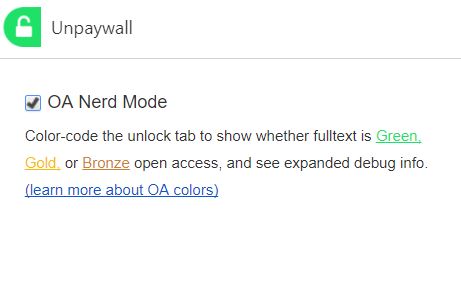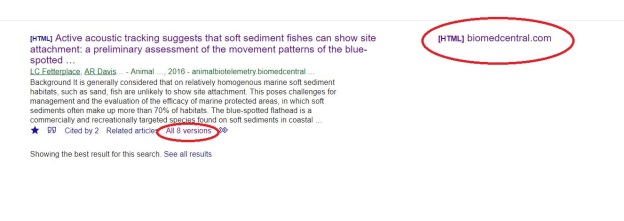
Picture: Severin. Stalder CC BY-SA 3.0 via wikimedia commons
If you do not have subscription access to academic journals through an institution then to access a large proportion of academic journals you will be charged a fee for each paper; fees of $30 or more per article are common. And if you need to access a lot of papers then the cost quickly adds up. Needless to say many people don’t have the means to pay. Of course you could stick to open access journals i.e. free to read and download (Head to the directory of Open Access Journals for easy access to a whole range of open access journals), but by doing so you will miss a lot of what’s happening in the academic world*.
If you can’t afford to pay then you have a few options to get around the paywalls.
Here are 5 ways around the great paywall of academia;
- The Snail Trail (legal but painfully slow): Some journals allow researchers to archive a full copy of their paper immediately on publication, on a personal webpage or university database (others have an embargo period,typically 12 to 24 months, after which papers can be added). Many also allow the authors a certain number of free access codes. To access this option takes time. You have to personally contact authors and hope they respond, or leave academic databases and search the web for personal webpage hosted versions, or access university databases. You can also often source the paper on ResearchGate or Academia (think academic LinkedIn if you don’t know what these are). Obviously someone relying on these methods is going to have to spend a lot more chasing up references than someone who has full subscription access. Method rating: 2/5 paywalled papers. This method is close to obsolete if you are needing lots of papers. I would always try some of the options below first. About the only plus is if you specifically want to talk to a researcher; then asking for their paper directly is a good way to start up the conversation.
2. The Open Access Button (legal): The Open Access Button instantly searches for a freely accessible version of the article or dataset you need. If unable to get access to an article you can create a request.
Rating 3.5/5. It is a little hit and miss sometimes but it is getting better.
3. Unpaywall (legal): The new kid on the block is unpaywall. An extension for chrome and firefox, it is still in beta testing with a full release date of the 4th of April…but it works now. I could source about 60% of the articles I tested. This one is a great tool and I suspect it will only get better. Combine it with the open access button and some snail trailing and you should be able to get to almost everything.
Rating 3.5/5. Super easy to use and although its at beta stage it works really well. Like the open access button it is only going to get better. The biggest downfall with both is that the papers they are most likely to struggle to access are papers that have just been published and are potentially the cutting edge research. ##Edit – I give unpaywall a 4/5 rating now as it seems to be more efficient than when I was first testing it and little improvements like the nerd mode (see below) have been added.

If, like me, you want to know the type of open access license the paper has then choose the nerd mode option. Read more about open access types here
##EDIT## Google Scholar does just as good a job of finding free versions of journal articles as option 2 and 3 above (although I find those two options are still useful when reading papers on journal websites, as in that case its faster to click the unpaywall button than to go into google scholar). If a free version of an article is available, a small link to it will appear to the right of each search result in Google Scholar and all the versions available will appear under the main link too (See below in red circles). According to protohedgehog “Google Scholar also indexes a lot of content that has been uploaded in breach of copyright (e.g. via ResearchGate). Unpaywall explicitly finds legal version of self-archived articles”, so you might want to consider that as well. 
4. Sci Hub (Questionable): While Sci Hub can get you almost any paper (and often very very quickly), depending on where you are and what you are downloading you run the risk of breaking copyright laws. Called the academic pirate bay by the big publishers, sci hub obtains copies of papers by various means, including scraping of publisher sites (this is different to unpaywall and the open access button that find PDFs uploaded by the authors themselves).
Rating: In short you can get anything here, but, and its a big BUT, you are taking some risks. It may be illegal in your country so check beforehand.
Who is downloading ‘pirate’ copies of academic papers? Well according to SCIENCE (one of the more prestigious academic journals) everyone is. Still, especially with the options at 2 and 3 available, it might be best to avoid Sci Hub (or at least use a reliable VPN) .
https://twitter.com/Sci_Hub/status/702208211307331585
###Edit for reasons mostly relating to big publishers trying to shut sci-hub down through the courts, the main sci-hub pages are out of action. But its the web…so mirror sites are up faster than they can shut them down or other sci-hub servers are still functioning e.g. http://sci-hub.tw/ ) and you can find the lastest working pages at https://en.wikipedia.org/wiki/Sci-Hub. As pointed out in the comments below http://libgen.io/ is similar to sci-hub.
5. #icanhazpdf (Questionable: depending what you are asking for): apparently you can also try this method…tweet the name of the paper you need with the #icanhazpdf hashtag and its likely someone will send it to you. I can’t see it being very effective for sourcing lots of papers but perhaps if you just need one that you can’t track down it could be useful.
Rating: 1/5 Not my cup of tea…if I want an authors archived version i’ll just ask them, otherwise there are better options. ###Edit: since writing this I have heard people say this method is very effective. I have even seen this recommended in one University’s official library output.
If you have used any of these options and have some thoughts or know of any other good options then feel free to throw them in the comments.
Bonus option for those lucky enough to have institutional affiliation. Even if your institute does not have a direct subscription, they can often use inter-library loans to get what you need:
*for now anyway. Europe for example is pushing forward with making their academics publish in open access format as the norm. Germany and Sweden are leading the charge.

Interesting article! I often look up an author’s research profile as sometimes they have a link to download the paper directly, or find them on researchgate.net. I’ve had a few requests for some of my papers from that website actually!
LikeLike
Yep very true and I do that for some papers but its not particularly efficient if you need to do it for a whole intro or a review…for every single paper you write. And that is the case for people truly on the outside of the wall. I have the massive and somewhat unfair advantage of subscription access to almost everything at the tip of my fingers. For now anyway. That means that for me to write a paper I have to spend a fraction of the time getting the papers compared to say someone in Iran or in a NGO in Australia that cant afford access. Little surprise then than that researchers in richer countries are able to publish faster.
LikeLike
A couple other options for non-affiliated researchers to consider: 1. Interlibrary loan (ILL) – many public libraries can obtain research articles for registered borrowers upon request, often at no or low cost to the borrower. If your local public library doesn’t offer this service, you may be able to purchase a non-resident library card from another public library for a reasonable annual fee. For example, you can purchase a full-use library card from Multnomah County Library (Portland, OR) for $180 per year – https://multcolib.org/library-cards-non-residents 2. If you live near a university campus, you can often obtain articles legally by visiting the university library in person. Inquire via the library’s website or at the reference desk.
LikeLiked by 1 person
Thanks for the comment and great tips. Those tips apply in Australia and the EU too as far as I know. Those options are very useful but never the less if you need to resort to those options (other than full use cards) or live somewhere without them you are at a distinct disadvantage to researchers with full online subscription access at hand and your ability to publish as quickly is very unlikely.
LikeLike
Prior to social media, I used to just email authors for PDFs. Sent out ~1500 requests. 10% no reply (could be for various reasons), 2% complied but didn’t allow me to send their paper to anyone else.The other 88% complied with every request.
LikeLiked by 1 person
Thanks for the comment and very good point. Still, in the review im working on I accessed over 2000 papers just for that single paper…even if every researcher is going to reply there is no way I would email 2000 people for one paper, luckily for me I guess I only need to do that for the odd paper. As it stands lots of people would actually have to email all 2000 people…for everypaper and that is one reason why I am such a big fan of things like unpaywall and open access.
LikeLike
Pingback: Unlocking paywalled research papers: Two big steps forward, two steps back | Quick Thoughts
Pingback: 5 free ways around the great paywall of academia. | lachlanfetterplace
Great!!
LikeLiked by 1 person
Libgen.io is a site similar to SciHub and Unpaywall!
LikeLike
Ive never heard of it to be honest. Does it have any advantages of the other methods?
LikeLike
Very interesting article. I have a question. What about articles that even scihub cant provide access to?
LikeLike
Thanks for the feedback Giannis. Mostly it is book chapters and certain smaller publishers that hard hardest to get hold of and the above methods may fail on. My only suggestions there are
1) email the author and hope for the best. I’d email all the co-authors too if you really need it.
2) sign up for a library that lets you request inter library lone options or has access via subscriptions.
3) Forget about it and cite someone else’s work.
LikeLike
Pingback: 5 free ways around the great paywall of academia. #Updated December 2017#
Very interesting! Great share. Never heard of Unpaywall until now. Will be testing it out and see how it goes.
LikeLiked by 1 person
Great article, very helpful – I’m often looking for copies of “pre-internet” & pre-digitization research papers. I was able to get what I needed (thanks to your article ) from Sci-Hub – but it made me curious, The Captcha is in Russian, and upon reading the wikipage – found this:
“Sci-Hub obtains paywalled papers by presenting illicitly held university usernames and passwords to the publishers’ websites via the universities’ proxy websites. The means by which Sci-Hub obtains usernames and passwords is unclear;[4] some appear to have been donated,[2] some were apparently sold to Sci-Hub,[5] and some appear to have been obtained via phishing and then were used by Sci-Hub.[6][7] ”
While I do find it frustrating to have to pay for a single paper, every time, I will henceforth be using the other resources you provided and Libgen.io, to fill my needs.
LikeLiked by 1 person
Thanks Mickey. It is a good point you raise. I guess I’d say that sci-hub is not the ideal solution to the publishing issues in academia & hopefully all the open access moves underway result in a better system (academics need to get better at archiving for green open access at the very least). For now t it is the most effective option though (and is forcing the hand of publishers to some extent) but people should be aware of the drawbacks. By the way those other resources like unpaywall have got a lot more effective since I first wrote this. I’d be interested to know how you go with libgen too as I haven’t really heard from many people how they find it.
LikeLike
I’m impressed, I must say. Seldom do I come across a blog that’s both
equally educative and engaging, and without a doubt, you’ve
hit the nail on the head. The problem is something too few men and women are speaking intelligently about.
I’m very happy that I came across this in my hunt for
something relating to this.
LikeLike
There doesn’t seem to be a single method for avoiding exorbitant fees for papers. You have to use a patchwork of methods, some already mentioned here. I start by using Google Scholar, then I try Academia.edu, then if I still can’t find it, I go to my local university and search using their periodical databases, I also try using my local public library portal to go into Academic Search Premier they used to have EbscoHost), and then if all else fails, I contact the author directly at their institution and ask politely if they would offer to send me the paper.
LikeLiked by 1 person
Thanks for your comment Joe. Unfortunately that is true as it stands. And although often authors are happy to share their paper that isn’t always the case. It also isn’t very efficient if doing something like a literature review where you often have to sort through thousands of papers (sometimes just to read the methods and eliminate the paper for example). For the moment at least the best thing authors can do is ensure that at the very least their papers are green open access and therefore accessible by many of the methods listed in the blog.
LikeLike
Hello. I’m an independant searcher, I would need to access Research gate, but I don’t have .edu address! What can I do?
LikeLike
Hi L. Without an institutional email you can’t automatically sign-up as it stands (I don’t think it lis only .edu that works though). You can try contacting them and requesting access using another email – ‘If you’re a published researcher but don’t have an institutional email address, we’re happy to consider your account request. Please contact us with a detailed description of your present and past institutional affiliations, field of research, and publications – preferably with supporting links. Please send all relevant information in your initial message, otherwise, your request could be delayed or even denied’.
LikeLike
Why aren’t your average person allowed access to research papers?
I do it as a hobby and actually do high tech experiments on my own budged.
All I need is referral to papers to look into various experimental pathways.
I don’t have institutional access. Does that make me unable to access papers?
LikeLike
You are allowed to access them but it varies a lot how you access them & many are behind a paywalls. Institutions have to pay a subscription price for access too and this means that many institutions do not have direct access to a lot of research either (or to a subset of research because they can only afford to subscribe to some things). I do not like this system and I think any research funded with public fund should be free to access for all. Nevertheless, at the moment it is the system…
So your options are either:
1) find open access (free to download research) – here is a good place to start https://doaj.org/
2) pay for access (never do this as an individual)
3) use the options above in the blog…
4) If you find research you can not access & manage to get it directly from the authors, then encourage them to make a version open access and available online.
LikeLike
Not sure this is still “live” but I was a psych lecturer at Monash Univ until 2009 and had over 100 published papers before retirement in 2009. I was an adjunct for a while but now have no links to academia. However, I’m busy looking for cures for pre-malignant vocal cord leukoplakia from which I suffer (and for which no cures exist). Trouble is, I can’t access the full versions of many Indian papers reporting promising results with curcumin. Would unpaywall be the best place to start do you think?
Barry
LikeLiked by 1 person
Hi Barry. Unpaywall will only work if the authors or their institutes have put up a version somewhere that isn’t behind a paywall. I think since I originally wrote this that google scholar does just as good a job as unpaywall at finding open access versions and doesnt require any addons (so its probably the first port of call). Do you have links to a couple of the paywalled papers that you can’t get access to and ill check if there is a way to them?
LikeLike
For those looking for books and popular media try https://1lib.sk/
LikeLike